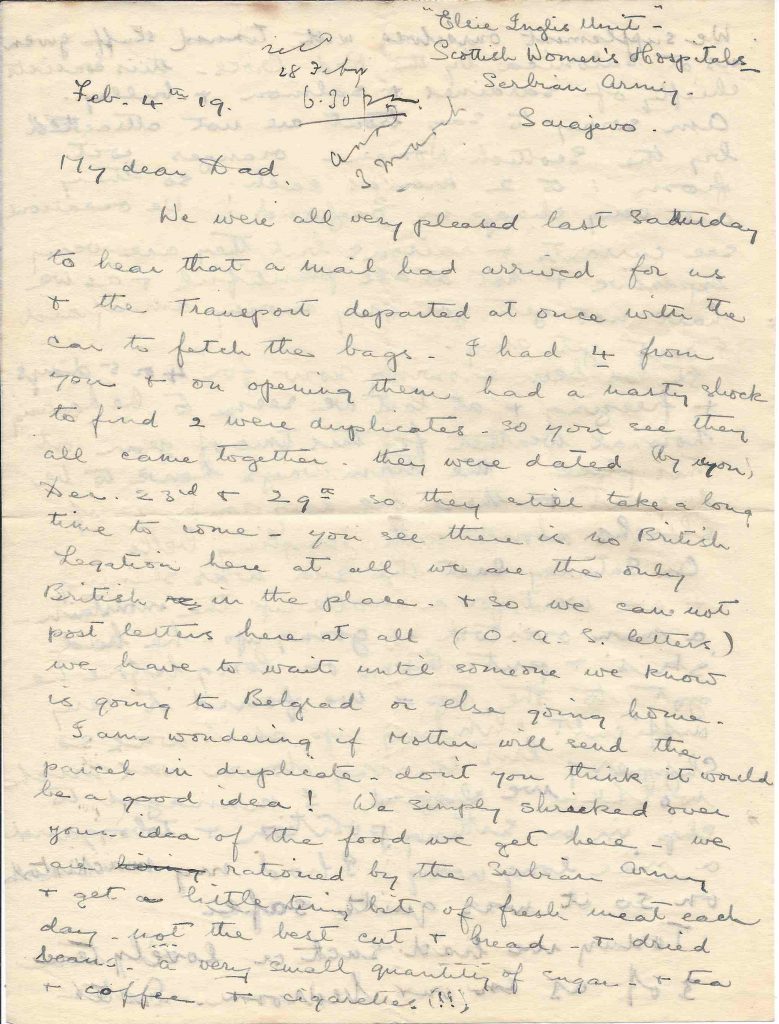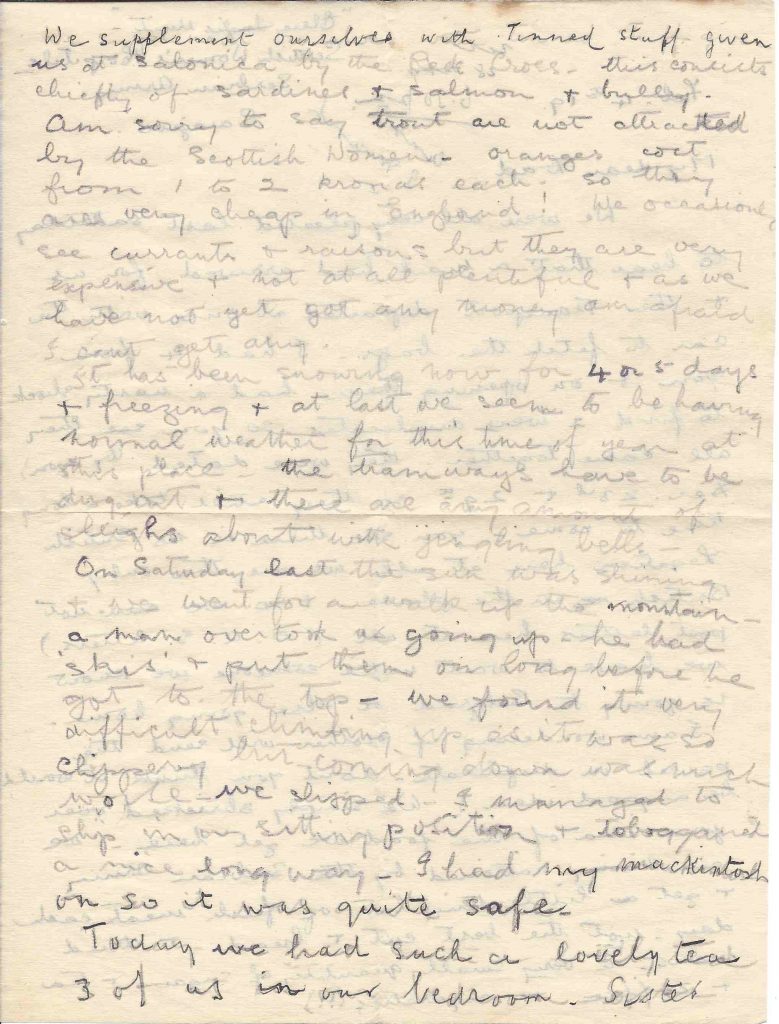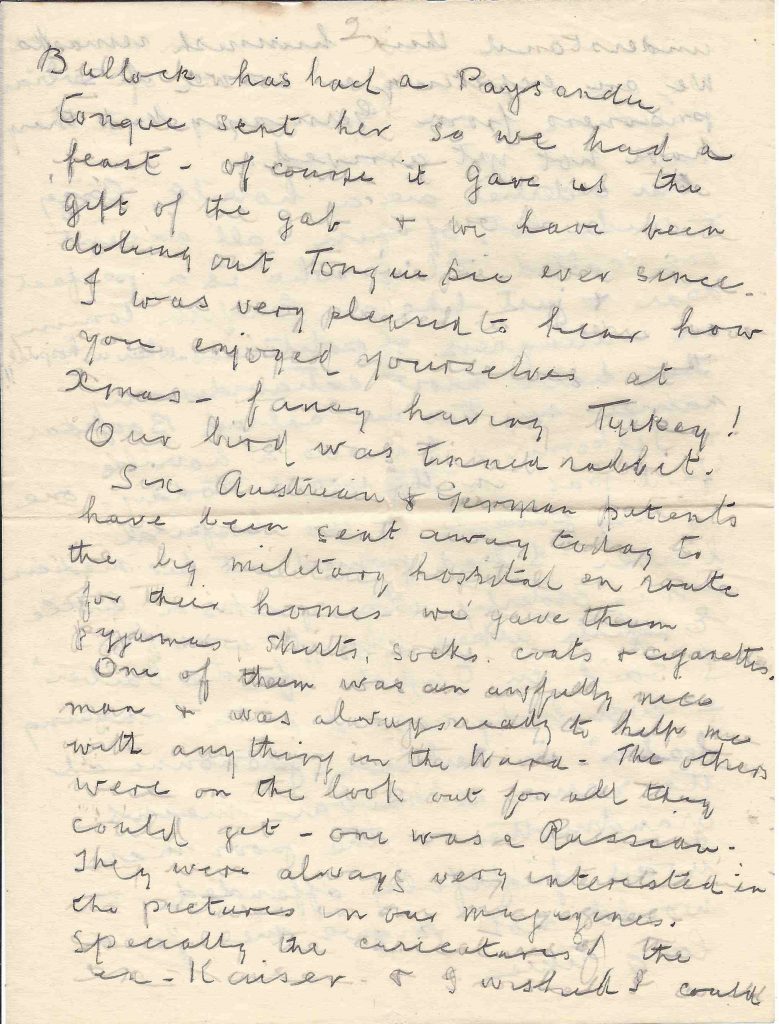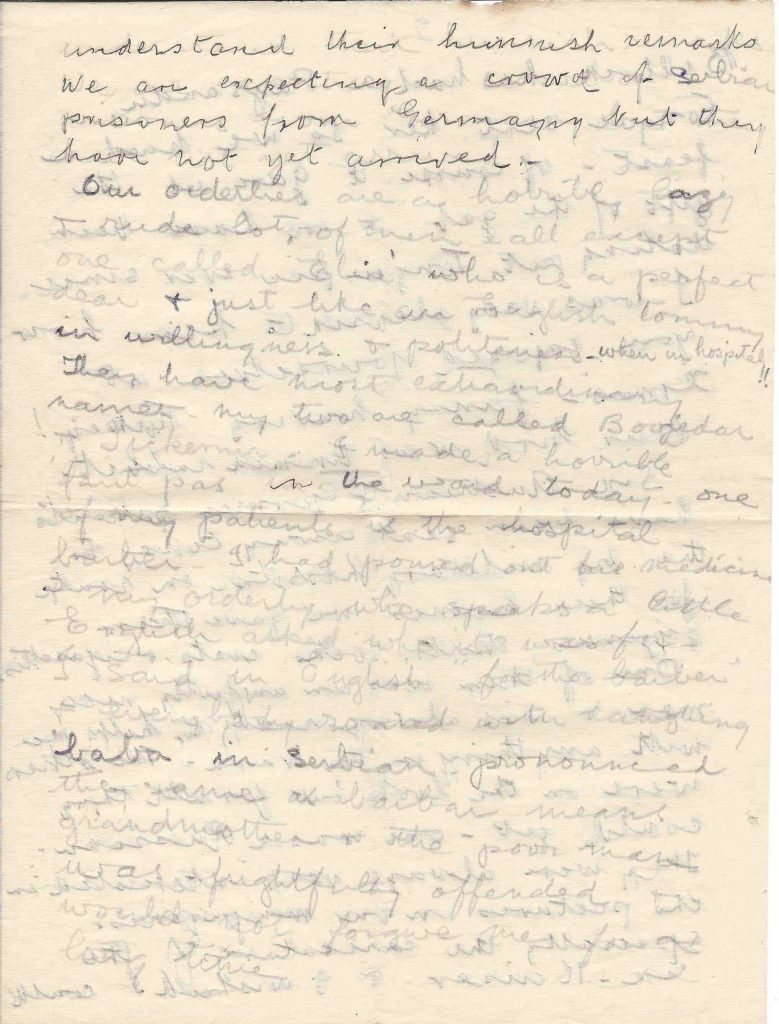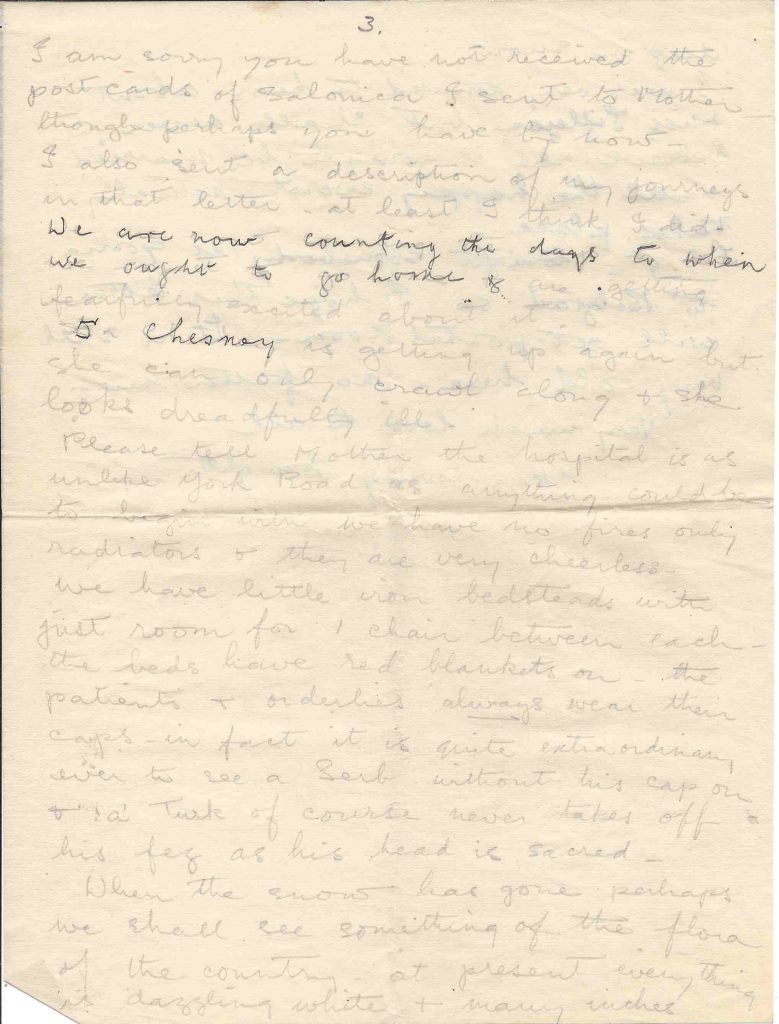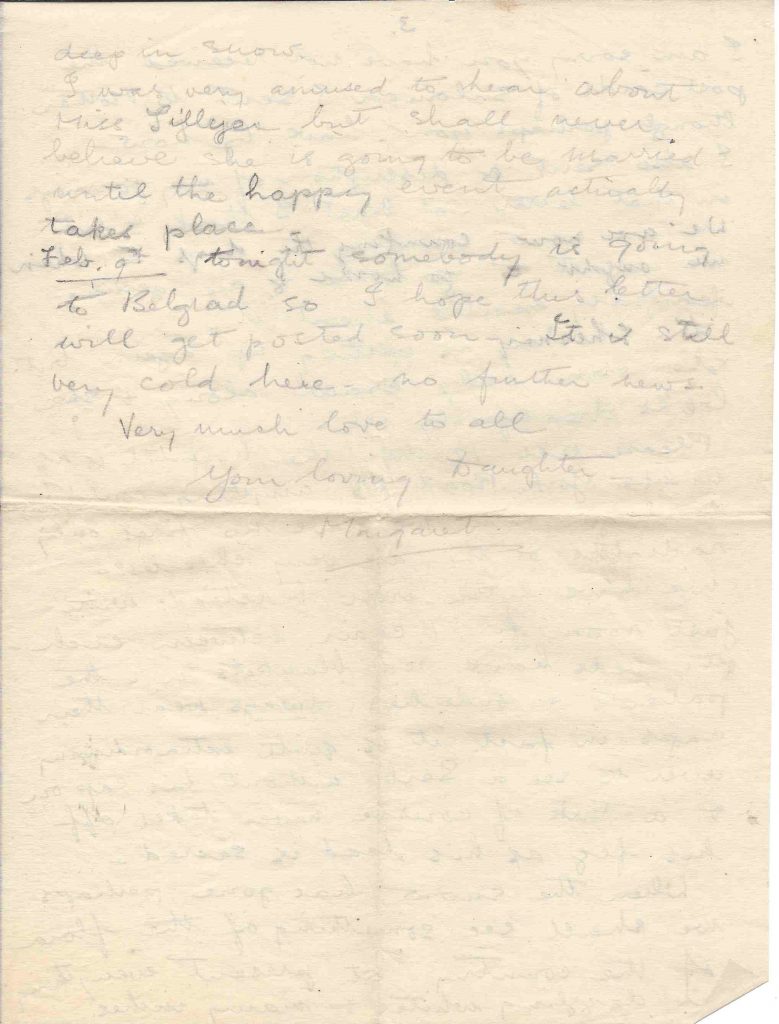My Great Aunt, Margaret Box, trained as a nurse, and, towards the end of the First World War, went out to Serbia to work for the Elsie Inglis Unit of the Scottish Women’s Hospitals. By February 1919 the numbers of war casualties and Spanish Flu patients have died down and while she continues her nursing duties in a hospital in Sarajevo she has been told that the unit will be going home later that year.
In this letter she writes to her father, she answers some of the questions her family back in England have been asking about her life in Serbia. She sent it on the 5th February 1919, and he received it on the 28th February, and replied on the 3rd March.
“Elsie Inglis Unit”
Scottish Women’s Hospitals
Serbian Army
Sarajevo
My Dear Dad,
We were all pleased last Saturday to hear that a mail had arrived for us & the Transport departed at once with a car to fetch the bags. I had 4 from you & on opening had a nasty shock to find 2 were duplicates – so you can see they all came together. They were dated by you Dec 23rd & 29th so they still take a long time to come. You see there is no British Legation here at all, we are the only British in the place & so we can not post letters here at all (o.a.s. letters) we have to wait until someone we know is going to Belgrade or else going home.
I am wondering if Mother will send the parcel in duplicate – don’t you think is would be a good idea !
We simply shrieked over your idea of the food we get here. We are rationed by the Serbian Army & get a little tiny bit of fresh meat each day – not the best cut & bread & dried beans – a very small quantity of sugar & tea & coffee & cigarettes (!!)
We supplement ourselves with tinned stuff given to us at Salonica by the Red Cross. This consists chiefly of sardines & salmon & bully. Am sorry to say trout are not attracted by Scottish Women. Oranges cost from 1 to 2 Kronas each, so they are very cheap in England ! We occasionally so currants & raisins but they are very expensive & not at all plentiful & as we have not yet got any money am afraid I don’t get any.
It has been snowing now for 4 or 5 days & freezing & at last we seem to be having normal weather for this time of year at this place. The tramways have to be dug out & there are any amount of sleighs about with jingling bells.
On Saturday last the sun was shining & we went for a walk up the mountain. A man overtook us going up. He had ‘skis’ & put them on well before he got to the top. We found it very difficult climbing up as it was so slippery but coming down was such ?wolte. we slipped – I managed to slip in a sitting position & tobogganed a nice long way. I had my mackintosh on so it was quite safe.
Today we had such a lovely tea, 3 of us in our bedroom. Sister Bullock has had a Paysandu tongue sent her so we had a feast – of course it gave us the ‘gift of the gab’ & we have been doling out tongue ?pie ever since.
I was very pleased to hear how you enjoyed yourselves at Xmas – fancy having Turkey! Our bird was tinned rabbit.
Six Austrian and German patients have been sent away today to the big military hospital en route for their homes. We gave them pyjamas, shirts, socks, coats & cigarettes. One of them was an awfully nice man & was always ready to help me with anything in the Ward. The others were on the look out for all they could get – one was a Russian. They were always interested in the pictures in our magazines, specially the caricatures of the ex-Kaiser & I wish I could understand their ?hunnish remarks.
We are expecting a crowd of Serbian prisoners from Germany but they have not yet arrived.
Our orderlies are a horribly lazy & rude lot of men & all except one called ?Elin who is a perfect dear & just like and English Tommy in willingness & politeness when in hospital !! They have most extraordinary names – my two are called Bordegar & Sickernis. I made a most horrible faux pas in the ward today. One of my patients is the hospital ?barber. I had poured out his medicine and my orderly who speaks a little English asked who it is for. I said in English “for the barber” and orderly roared with laughing ‘baba’ in Serbian, pronounced the same way as ‘barber’ means grandmother and the poor man was frightfully offended and would not forgive me for some time.
I am sorry you have not received the postcards of Salonica though perhaps you have by now. I also sent a description of my journey in that letter, at least I think I did.
We are now counting the days to when we ought to go home & getting frightfully excited about it.
Dr Chesney is getting up again, but she can only crawl along & she looks dreadfully ill.
Please tell Mother that the hospital is as unlike York Road as anything could be. To begin with we have no fires, only radiators & they are very cheerless. We have little iron bedsteads with just room for 1 chair between each. The beds have red blankets on. The patients and orderlies always wear their caps – in fact it is quite extraordinary to see a Serb without his cap on & a Turk of course never takes off his fez as his head is sacred.
When the snows have gone perhaps we shall see something of the flora of the country – at present everything is dazzling white &n many inches deep in snow.
I was very amused to hear about Miss Tillyer but shall never believe she is going to be married until the happy event actually takes place.
Feb 9th – tonight someone is going to Belgrade so I hope this letter will get posted soon. It is still very cold here, no further news.
Very much love to all
Your loving Daughter
Margaret
Notes
O.A.S letters
Keeping in touch was very important for service personnel, so postal charges were waived for the duration, the letters being labelled O.A.S. for On Active Service. The down side is they were subject to review by the censor.
Paysandu tongue

This tinned Ox Tongue, produced in Paysandú in Uruguay was popular in Victorian times. It is mentioned in The Diary of a Nobody, where in Chapter 8, on November 14th Mr Pooter plans to have a Paysandu tongue as part of the fare for a party he is arranging. It also appears in H Rider Haggard‘s novel She, where in Chapter 5 the shipwrecked heroes are washed up on the east coast of Africa, and are glad they provisioned their boat with Paysandu potted tongue, and other preserved foods.
The ex-Kaiser
Kaiser Wilhelm II abdicated in November 1918, an event of great importance to all Germans, particularly as they would have joined the army of the Kaiser, and Germany was now a Republic. The magazines would have been in English, but text in the caricatures would sometimes be short.

The German and Austrian soldiers would have been away from home since the end of the war, and although the post to Britain was slow, at least there was a functioning postal system. Germany was going through a revolution, as was Austria-Hungary, and I doubt if maintaining a postal service to Serbia was a high priority. The Russian too would be returning to a very different political system than the one he had left.
Unlike York Road
York Road was the General Lying-In Hospital – one of the first Maternity Hospitals. According to the 1920 Midwives Roll Margaret enrolled as a Midwife on 10th February 1918, having passed the Central Midwives Board Examination, and her address in 1920, but probably where she trained as well, was General Lying-In Hospital, York Road, London. S.E. She had already trained as a nurse at Guys Hospital between 1914 and 1917.
The letter tells us that, presumably, the Lying-in Hospital had real fireplaces, with a jolly coal fire, where we might regard radiators as safer and more hygienic. The building which was being used as a hospital in Sarajevo had been built as a boy’s school.
Serbs and Turks
I think Margaret is using the term Serbs to refer to the local inhabitants who are Orthodox Christians, and Turks as the local inhabitants who are Muslims.
